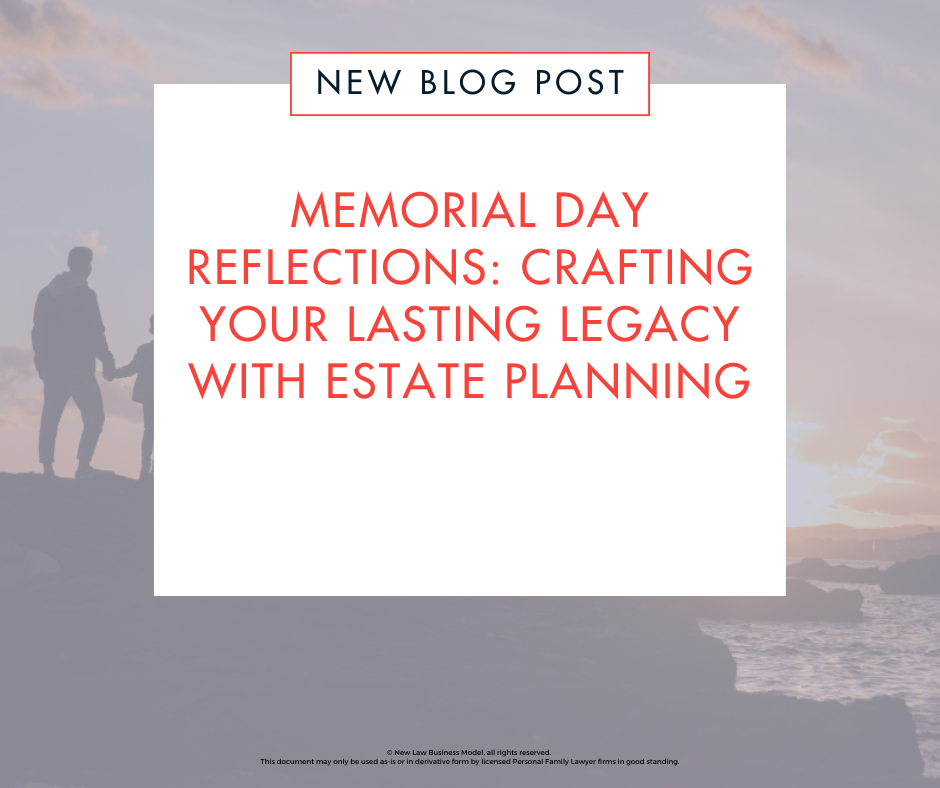Memorial Day brings with it an opportunity to reflect on the concepts of mortality, remembrance, and legacy. As we remember the brave men and women who lost their lives serving in the military, may this day also inspire you to think about the legacy you wish to leave behind.
But, first, what is a legacy, really? “Legacy” is often misunderstood and so is estate planning. Legacy and estate planning are often perceived as “only for the wealthy” and/or “philanthropic”. But that couldn’t be further from the truth.
Legacy isn’t just about money or wealth. As my mentor Ali Katz says: “Legacy is the choices you make now, the actions you take now, the way of being you are now, and the ripple of impact beyond your lifetime.”
Legacy includes capturing your life stories, passing on your values, and ensuring your loved ones have a record of the essence of what matters to you. These are the things you leave behind that mean the most to your loved ones. Money can’t even compare. Thinking of it this way, it’s easy to see that every human has a legacy to create and leave behind, including you!
Estate planning, on the other hand, is something many people think they understand, but really don’t. It isn’t just about getting your Will done, or documenting what your end-of-life health care wishes are. Estate planning, like legacy, encompasses much more. It’s not about getting some documents signed. Estate planning is the vehicle that allows you to leave a legacy.
So let’s dive in for more understanding on what “legacy” really means and how you can secure your legacy for the benefit of your loved ones.
Understanding What Legacy Truly Is
Legacy, at its core, is about connecting the generations, and Life & Legacy Planning is the way to do it. Here’s an example. Consider a teacher who has spent her career fostering curiosity and resilience in her students. She may not have millions of dollars to give away, but she can use her estate plan to leave her personal library to a local school. She may even set up a small scholarship fund in her estate plan so she can continue supporting education long after she’s gone. And, if she has children or close friends she cooks for regularly, she may leave a book full of her recipes they all love.
Her legacy then becomes not just about the resources she left behind, but about inspiring future generations to value learning and perseverance, and nourishment. Similarly, your estate plan can be crafted to perpetuate the principles you deem most important, making your influence felt well into the future.
So now, take a minute to reflect. What principles are most important to you? How do you want to use them to connect your generation to the next?
Estate Planning as a Form of Love
In emphasizing the value of estate planning as the vehicle that allows you to leave a legacy, know that estate planning should be tailored for each person, each person’s family dynamics, and each person’s values. No two people are the same, no two families are the same, and therefore, no two estate plans should be the same. This personal touch transforms estate planning from a mundane task, that most people put off because they don’t see the value, into a powerful act of love.
Proper and customized estate planning can also alleviate the potential for family conflict, which oftentimes results in irretrievably broken family relationships. But when you use estate planning as a vehicle for securing your legacy, it has the power to preserve these relationships and uphold family harmony. Estate planning is then transformed into an enduring gesture of care and love.
Consider as an example a devoted husband and father who deeply valued his family’s annual summer retreats to a beloved lakeside cabin. Understanding the special place the cabin held in his and his family’s hearts, he specifically detailed in his Will his wish for the property to remain in the family, passing down to his children and grandchildren.
He also set up a small fund to cover the cabin’s upkeep, ensuring that his family would continue to enjoy it without financial burden. In doing so, this loving husband and father not only preserved a cherished family tradition but also created a physical space for remembrance and togetherness, allowing future generations to share in the joy and serenity he found there. This thoughtful element of his estate plan demonstrates how such preparations are acts of love, weaving his memory and values into the fabric of his family’s future.
Take another minute to reflect. How would you craft your own legacy into a plan of action?
Practical Steps to Create Your Legacy
Taking the first step in estate planning can feel daunting, but when you frame it as an act of love and legacy preservation, it becomes a deeply meaningful process. Start by identifying what matters most to you. This could be family traditions, a commitment to charity, a passion for art, or anything else that defines your personal story and values. Begin by listing these priorities and considering how they can be integrated into your estate plan.
Next, consult with a Personal Family Lawyer (“PFL”) who understands the intersection of legacy and estate planning through a special process called Life & Legacy Planning. A PFL will help you get clear on your values and goals, then together, you’ll create a customized plan that fits you and honors the legacy you wish to leave behind. For instance, if you, like the devoted father in the example above, have a cherished family property, a PFL can advise you on how to set up a trust to manage that property and stipulate how it should be maintained and used by future generations.
A PFL will also record a Life & Legacy Interview that your family will cherish for years. The Interview allows you to express your love, hopes, and reasons behind your decisions and is a comforting and clarifying piece for your loved ones, ensuring they understand your intentions and feel your presence in the provisions you’ve made. You can even record messages to send to beneficiaries that provide stories and details about a special possession or heirloom and why you chose to give it to them.
By taking these steps, you’re not just planning for the future; you’re crafting a legacy that carries your values and love forward, ensuring that your impact on the world persists and that your memory continues to serve as a source of inspiration and unity for those you hold dear.
Memorial Day Is an Opportunity for Action
This Memorial Day, as you reflect on the sacrifices of those who gave their all (and what a legacy that is!), take action to get your estate plan in place. Remember, estate planning is not just for the wealthy; it is for everyone. It’s about making your mark, much like the soldiers we honor, whose legacies are remembered for generations.
So let this Memorial Day be the catalyst for you to start or update your estate plan. In doing so, you honor your life and ensure connection among the generations. Just as we come together as a nation to remember, let’s also take steps to put our love into action.
How We Can Help You Take Action Today
As a Personal Family Lawyer Firm, we don’t merely dispense legal counsel; we empower you to reflect on how you want to be remembered and how you want to pass on the values you hold dear. We take the time to fully understand what’s important to you, and then together, we’ll craft a thoughtful and holistic plan that results in the greatest gift you can leave your loved ones: your love.
To learn more about how we approach estate planning as the intersection of love and legacy, schedule a complimentary 15-minute call with our office.
This article is a service of Bret Christiansen, a Personal Family Lawyer® Firm. We don’t just draft documents; we ensure you make informed and empowered decisions about life and death, for yourself and the people you love. That’s why we offer a Life & Legacy Planning Session™, during which you will get more financially organized than you’ve ever been before and make all the best choices for the people you love. You can begin by calling our office today to schedule a Life & Legacy Planning Session™.
The content is sourced from Personal Family Lawyer® for use by Personal Family Lawyer® firms, a source believed to be providing accurate information. This material was created for educational and informational purposes only and is not intended as ERISA, tax, legal, or investment advice. If you are seeking legal advice specific to your needs, such advice services must be obtained on your own separate from this educational material.







